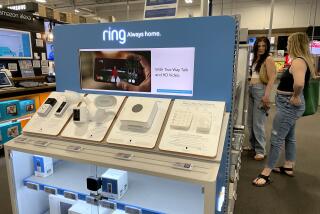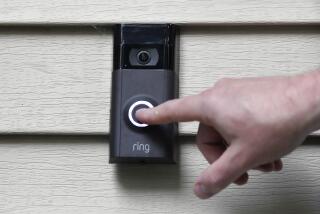Tech Woes? Firms Have Your Geek
- Share via
In the midst of the Medusa-like tangle of cables in Tucker Barash’s apartment sat a computer laid low by viruses.
The 20-year-old Brentwood college student didn’t know how to diagnose -- let alone treat -- his sick PC. “When it comes to technology,” he said, “I just get so frustrated.”
That’s not a problem these days: For the gizmo-challenged, there is professional help.
Barash paid $159 for an 85-minute house call from geek-for-hire Grant Garrett, who not only purged his PC of various viruses and spyware but also counseled him on how to get the most out of his iPod, Sony DVD player and an Xbox game console.
Garrett works for Best Buy Co.’s Geek Squad, a team of techies that helps customers mount skinny new plasma televisions on walls, load iPods with songs or perk up sluggish computers. Tech giants including Dell Inc. and Sony Corp. offer similar services, with the same self-interested goals: to encourage timid customers to try new technology and to reduce returns from people who can’t make their fancy new gadgets work.
Time was, the trickiest chore for most buyers of consumer electronics was adjusting the rabbit ears on their TVs. Improving technology has allowed manufacturers to pack more features into smaller boxes. Not only that, but more and more devices plug into each other.
“These days, you don’t have one thing hooked up to your PC; you have 50 things hooked up,” Garrett said. “It’s definitely getting more complex.”
Custom installation, hand holding and service contracts are nothing new for the wealthy, but those services have only recently been offered to the average buyer. Many appear interested: In a Dell survey of 1,000 consumers this year, one-third said they would pay for a service to help them understand software programs embedded in such devices as cameras and TVs.
“A lot of people told us, ‘Technology comes with headaches. Help me,’ ” said Mike George, general manager of Dell’s U.S. consumer business.
So last month, Round Rock, Texas, based-Dell launched a suite of assistance options, including hooking up wireless networks for $159 and installing plasma TVs for $169 to $699.
“We’re in this period where the possibilities for what we can do are exploding,” George said. “I can download music. I can record TV shows. I can edit photos and movies and watch them on my PDA. We’re living in a world with lots of choices. But that inherently creates complexity.”
Sony, through the expansion of its Sony Style stores this year, is offering custom installation through contract technicians for select products such as plasma TV sets. For its part, Best Buy this year rolled out the Geek Squad, a business it bought two years ago, to its 642 stores.
Garrett is a Geek Squad “double agent,” a select group of 700 technicians who counsel customers in Best Buy stores and make house calls (an additional 6,500 “counterintelligence agents” work only in stores). Garrett, who’s been with Best Buy for four years, has performed such services as setting up wireless networks, installing home theater systems, programming TiVos and teaching people how to use digital cameras.
He’s a modern day repairman. His toolkit: a black canvas CD case that holds about a dozen discs. One is called “Mojo.” Another, “MRI.” They are most of the programs -- utilities, patches, fixes -- Garrett would ever need to tackle his job.
The proliferation of devices that connect to the PC or the Internet is one factor in the growing complexity of technology, said Robert Stephens, who founded Geek Squad in 1994 as a college student and sold it to Best Buy in 2002 for an undisclosed sum.
“Everything is starting to talk to each other,” Stephens said. “You take a picture on your cellphone that you can e-mail to your computer. You can order a copy of that print on the Internet. You can print that picture out on a T-shirt. That $50 Internet connection is starting to be used for all kinds of things, not just the PC.”
Making all that work harmoniously is not easy when the devices are from different manufacturers using different connection protocols, different jacks and different remote controls.
Another culprit is a habit among companies to cram more features into devices.
“In every category, the products are getting more complex,” said Gary Arlen, president of Arlen Communications Inc., a technology research firm in Bethesda, Md. “It’s partly because companies believe that the only way to stay ahead, to differentiate themselves from their competitors, is to pile on more features. Chances are, people don’t even know about 90% of the features on their cellphone, let alone use them. It’s feature overkill.”
It wasn’t always this way.
Take the radio. At the turn of the last century, only enthusiasts embraced radios because they required complex adjustments to operate. Over the years, the radio became simpler until it was finally boiled down to two knobs -- one to turn it on and change the volume, the other to change stations.
But in recent years, radios have become more complex as features are packed in and new technologies such as satellite broadcasting and Internet radio have been introduced.
Technology design guru Donald A. Norman, in his book “The Design of Everyday Things,” talks about the U-curve of technology, using the evolution of the radio as his example.
“As technicians become more competent and an industry matures, devices become simpler,” Norman writes. “But then, after the industry has stabilized, newcomers figure out how to add increased power and capability, but always at the added expense of complexity.”
This, many industry watchers say, is where the consumer electronics industry is today -- on the cusp of a dramatic shift from stand-alone, analog devices to connected digital devices.
“This industry turned digital pretty quickly,” said Mike Fasulo, president of Sony’s ESolutions unit, which operates the Sony Style stores. “We in this industry have talked about it for years and years, and then it just happened. But in the consumer’s mind, it’s been more than a little confusing to them.”
Other executives also are well aware of the problems, and some believe that offering at-home services can accomplish a number of things at once: It can reduce returns from frustrated buyers, create additional revenue from selling these services and help nudge consumers into the digital era, where companies hope to sell a cornucopia of new products and services.
“Returns are clearly an issue for the industry,” said Fasulo, who noted that the vast majority of electronic devices returned aren’t defective. “Typically, customers return the product because they don’t understand it. If we make sure people understand what they can get out of the product and know how to use it, it will decrease returns.”
The revenue stream from these types of troubleshooting services are too early to tabulate. But the demand was clearly there for people like Garrett to make house calls, said Dave Blakely, a director at Ideo, a technology design firm in Palo Alto.
“They represent an extremely important trend,” Blakely said. “You call a mechanic, a plumber, an electrician to deal with problems. As technology becomes increasingly essential to people’s lives, people will want to make house calls to technology experts.”
Arguably the biggest factor driving the consumer electronics industry to give consumers a helping hand is the desire to speed the transformation of homes into digital entertainment playgrounds -- outfitted with next-generation TVs, stereos, game consoles, portable devices and digital video recorders, such as TiVo.
“Last week, I was setting up a bunch of TiVos,” Garrett said. “It’s a grown-up’s toy, but not every grown-up knows how to use one, even though it comes with a pretty good manual. There’s where we come in. It’s corny, but our motto is that we read the manual so you don’t have to.”






